


Дорогие читатели! Представляем вашему вниманию третий номер журнала «ЛОГИСТИКА». Прежде всего хотим обратить внимание читателей на нашего нового партнера R1 Development – девелоперскую компанию, которая создает среду нового поколения и специализируется на строительстве индустриально-логистической, коммерческой и жилой недвижимости. Один из проектов R1 Development – сеть индустриальных парков «Дружба».
Дорогие друзья! Завтра, 18 марта, начнет свою работу 29-я Международная выставка транспортно-логистических услуг, складского оборудования и технологий TransRussia 2025:
Дорогие друзья! Совсем скоро откроет свои двери крупнейшее мероприятие логистической отрасли TransRussia 2025. Специально к выставке мы выпустили два номера журнала «ЛОГИСТИКА», в них много интересной и полезной информации как для посетителей мероприятия, так и для экспонентов.

Barcelona
The twentieth edition of the leading Exhibition on Logistics, Transport, Intralogistics & Supply Chain in Southern Europe, SIL 2018, has carried out the IX Círculo Logístico Barometer where it has analyzed in depth the logistics’ industry. 1,067 Spanish directors of Logistics & Supply Chain from different industry sectors have participated as members of the SIL 2018 Círculo Logístico. The profile of the sector of activity of the different directors or heads of Logistics or Supply Chain that have participated in this IX Círculo Logístico Barometer is the following:
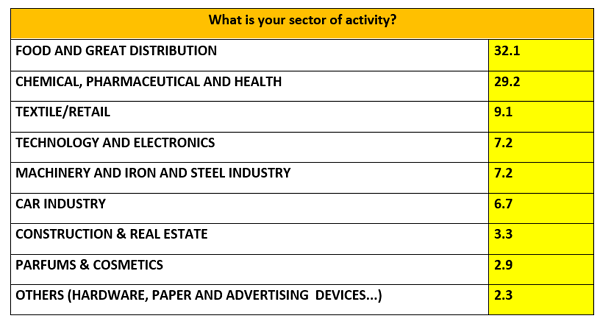
Collaboration and interchange are increasingly important for the future logistics industry
One of the conclusions that may be deduced from the SIL’s IX Círculo Logístico Barometer is that the Logistics or Supply Chain directors of the Spanish industry consider that the most important aspect of the future in logistics will be the collaboration in matters of transport (39.4%). This fact has increased a 3.2% with respect to the 2017 Barometer. Another aspect that will be gaining increasing importance will be the interchange of standardized information (32.5%), an aspect that has increased a 12.3% with respect to last year. Collaboration in terms of storage (25.12%) occupies a third position in this ranking. Other aspects such as multichannel flexibility, automation and parcel industry, visibility in the supply chain, eCommerce, Data Sharing, IoT and robotization of processes represent a 1.6% with respect to the aspects that will be essential in the future of logistics.
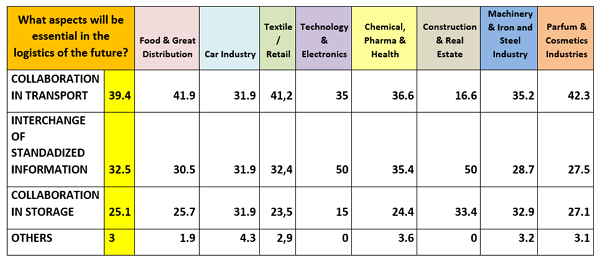
Analytical capability and innovation are essential qualities for a good logistics person
A 32.9 % of the Logistics or Supply Chain directors that have participated in the current edition of the Círculo Logístico Barometer considers that the main quality that a “good logistics person” must have is to be innovative (32.9%). The sector that most values this quality is the chemical, pharmaceutical and health industry (43.1%) and the one that values it least is the machinery and steel industry (17.7%).
In the second place we have found the fact of being analytical (27.7%). This aspect has considerably increased with respect to last year with a 15.9% and having passed from the fourth most important quality to be a “good logistics person” to the second position.
Bargaining skills (18.1%) or the fact of having empathy (11.5%) are also very important in order to be a “good logistics person”. Having bargaining skills will be very important if a logistics person wants to be successful in the technology and electronic industries (20.2%) whereas if the aim is to succeed in the construction and real estate industries, the most valued quality is empathy (13.3%).
The 1,067 directors of Logistics & Supply Chain that have participated in the IX Círculo Logístico Barometer also consider importat that a “good logistics person” has patience (8.2%), with an increase in this quality with respect to last year.
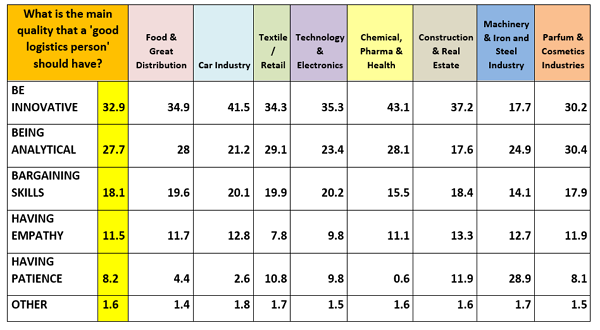
Experience and team working skills, the most valued aspectos of the logistics professionals
At the time of hiring a logistics professional, the directors of logistics or Supply Chain of the Spanish industrial companies value above all the candidate’s experience (33.3%), a fact that has reduced itself a 5.2% with respect to 2017. The chemical, pharma and health industries (31.6%) and the construction & real estate industries (36.3%) are the ones that value most the candidate’s previous experience, whereas in the opposite side we find the technology and electronics sector (30.1%).
The team working skills, with a 26.6%, are in a second position with respect to the most important aspects that a logistics candidate must have. This number has increased a 4.9% with respect to the years 2017 and 2016. The candidate’s education is in the third position, with a 12.1%, followed by languages and computers knowledge, with a 10.5%, and a digital mentality, with a 9.8%. Precisely, it is the first time that the digital mentality quality among logistic professionals appears in the Círculo Logístico Barometer, and this year it has done so in quite an outstanding way.
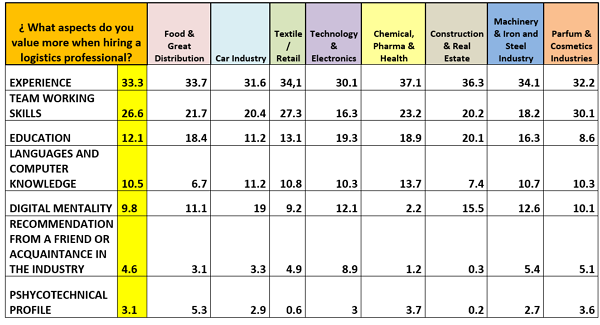
A 49.9% of the Managing Directors consider that the Logistics Director in their company is well valued
In spite of the importance that logistics have in any company’s success, only a 49.9% of the Managing Directors consider that the figure of the Logistics Director is well valued in his or her organization. A 21.8% of the respondents believe that the Managing Directors of the company where they work consider the figure of the Logistics Director as essential (24.2%). This fact is rather worrying if we compare it with the results obtained in last year’s Barometer, since it has diminished a 25.8%. At the same time, a 28.1% of the Managing Directors consider that the figure of their company’s Logistics Director as quite important, a 26.3% say that it is fairly valued, a 23.5% consider that should be more valued and a 0.4% that it isn’t valued at all.
With respect to sectors of activity, the Managing Directors of the construction and real estate industry (63.1%) and food & great distribution (61%) are the ones that value most the figure of the Logistics Director. On the other hand, the car (33.4%), and the Machinery & Iron and Steel industries (37.5%) are the ones that value the least the figure of the Logistics Director.
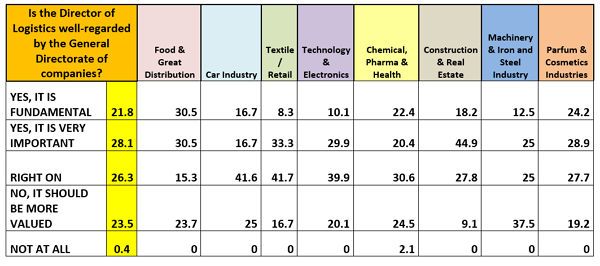
Almost all companies subcontract transport services
The most subcontracted logistics activity, as has been happening in the last Círculo Logístico Barometers, is, without doubt transport services. A 96.4% of the 1,067 Logistics or Supply Chain Directors that have participated in the IX SIL 2018 Círculo Logístico Barometer confirm that they subcontract their company’s transport services in a 96.4%. This number has increased a 5.2% with respect to last year and places transport services as leader in this category since it is far from the second most externalized activity, distribution services, with a 55.4%. It must be highlighted that distribution services have increased considerably with respect to last year and has grown an 11.1%.
The textile and retail industries, with a 99.2%, are the ones that most subcontract transport services, whereas the technology and electronics industry (88.6%) is the one that subcontracts it least of all. With respect to distribution services, its main client comes from the textile and retail industries (61.8%), and the construction and real estate industry is the one that subcontracts this service least of all.
The third position of the most subcontracted service belongs to the packing and packaging services with a 26.9%, followed by material handling and stock management services (19.7%), systems automatization (17.6%), production (9.8%), and purchases (3.6%).
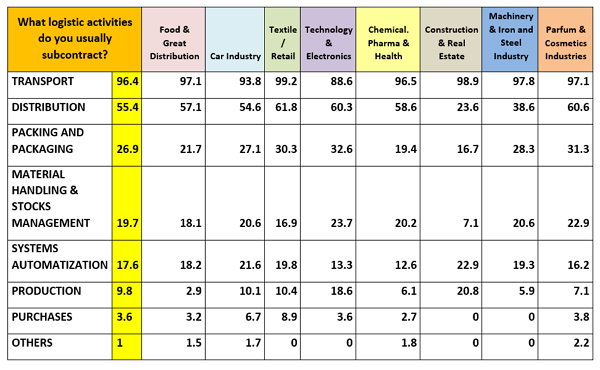
In 97,3% of the business models analyzed, transport services are important
A 97.3% of the Logistics Directors surveyed claims that transport services management is important or very important in its company’s business model. In particular, a 64.2% considers that the transport services management is fundamental in its company’s business model and a 33.1% consider that it is important but not fundamental. Only a 1.6% of the Logistics Directors that have participated in the IX Círculo Logístico Barometer claims that the transport services management is not important in its company’s business model and a 1.1% consider that it has no importance at all.
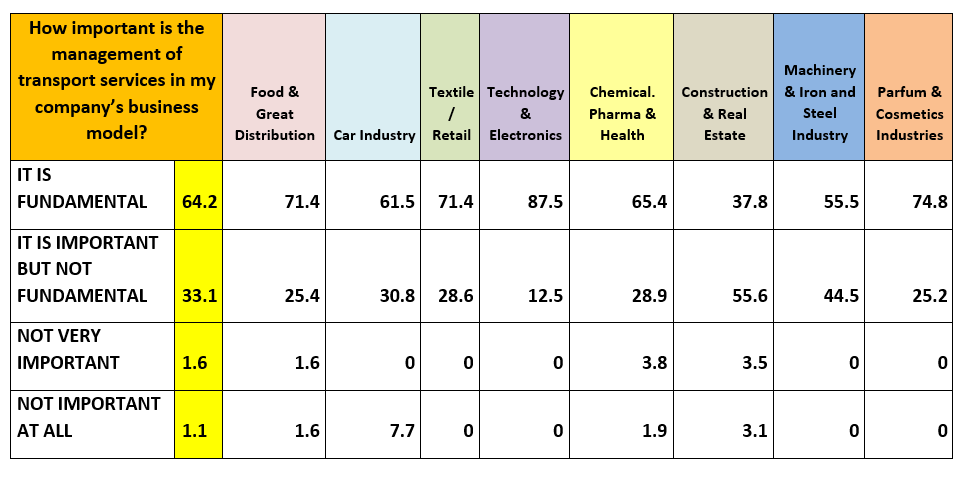
Quality prevails over price
Quality remains the most valued aspect for the Logistics or Supply Chain Directors of the Spanish companies at the time of subcontracting a logistic service with a 78.6%, a very similar figure to last year’s. The construction industry is the one that values most quality in a 96.4% of the cases, whereas the textile and retail industry as well as the technology & electronics one, with a 66.5% and a 66.8% respectively, are the ones that value quality least of all.
The second most valued aspect is savings with a 54.7%, a number that has increased a 4.3% with respect to 2017 when it was positioned in the fourth place of this ranking. Experience and trustfulness of the supplier are placed in the third position with a 54.2%, practically in the same level as savings. The sectors that value most savings are technology & electronics and parfum & cosmetics industries, with a 60.3% in both cases
Also, the flexibility of the supplier (32.3%) has lost a 21.5% with respect to last year and has moved from the second to the fourth position in this ranking, followed by specialization (29.7%), speed (26.6%), business optimization (13.5%) and human resources (5.7%).
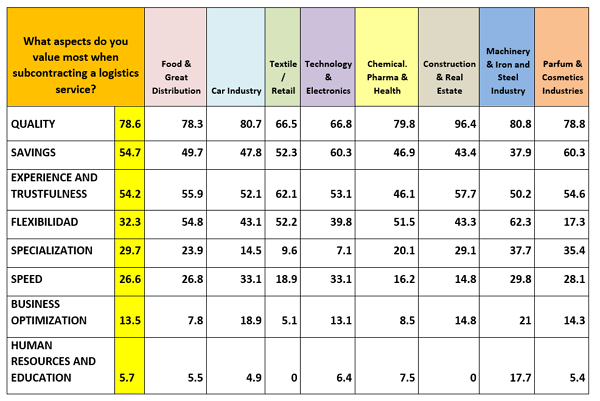
An industry deeply concerned with innovation
Service and quality keep on occupying the first place as the main concerns for the Spanish freight road transport users. A 21.9% of the logistics & Supply Chain directors that have participated in this survey consider service & quality as their main concern, a number that has increased a 2.1% with respect to the 2017 Barometer and a 1.5% with respect to 2016. In the second place, we find costs & stocks efficiency and optimization with a 18.6%, a number that has increased a 0.0% with respect to last year.
Speed, punctuality and commitment are still in a third position referring to the main concerns for the logistics and supply chain directors, with a 14.8%, a 0.3% more than last year. In the fourth place, we find communication and information (technologies of control) with a 12.2%, a number that has increased a 5.3% with respect to last year and has moved upwards one position in this scale.
Innovation must be highlighted as one of the logistic concerns that have increased more. Innovation has grown a 3% with respect to last year and has reached an 8.1%. Another concern to be highlighted is the sector’s adaptation to the 4.0 industry, an aspect that has grown a 3% with respect to 2017.
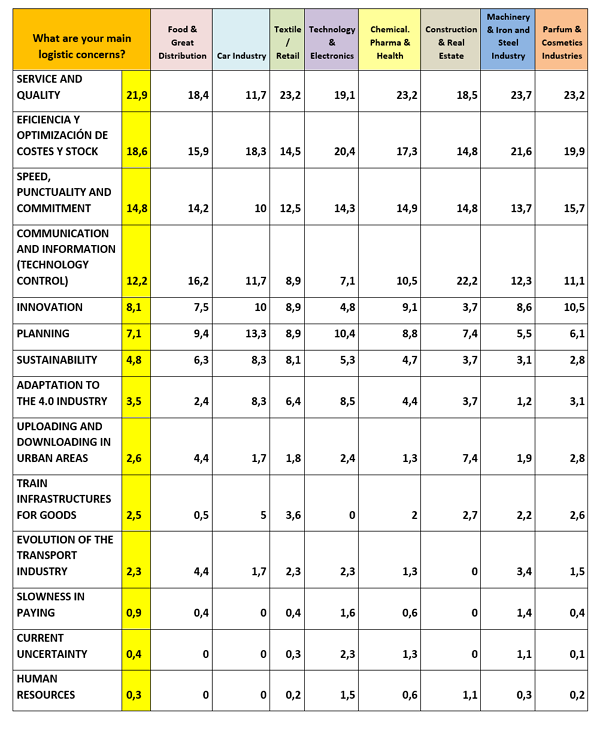
The number of freight road transport users in favor of the 44 tons of maximum load implementation has decreased but it is still a majority
The IX edition of the SIL 2018 Círculo Logístico Barometer has concluded that the freight road transport industry is in favor of the implementation of the 44 tons maximum in the road transport of goods, although the number of followers has decreased considerably. In this sense, last year a 75% of the logistics & Supply Chain directors were in favor of its implementation, and this year the number has decreased up to a 56.7%. This means that there are an 18.3% less of road transport industry users that are in favor of the implementation of the 44 tons, even though the followers are still a majority.
On the contrary, a 7.5% is against of establishing the maximum of 44 tons of goods in the road transport, a number that has increased a 2.8% with respect to 2017. A 35.8% of the respondents is indifferent to this question, a number that has also increased a 15.5% with respect to last year.

Companies will invest less in sustainability than last year
Another significant aspect to be drawn from the IX SIL 2018 Círculo Logístico Barometer has been that the freight road industry is less committed with the sustainable criteria since a 71.6% claim to invest many resources in sustainable criteria. This is decrease of 8.1% with respect to last year. Also, a 24.6% claim to invest little in sustainable criteria, a number that has increased a worrying 5.1% with respect to 2017. A 3.8% of the Logistics Directors that have participated in the SIL 2018 Círculo Logístico Barometer claims that the company they work in invests nothing at all in sustainable criteria. This number is a 2.1% larger than in 2017.
With regard to sectors of activity, the chemical, pharma and health industry is the most sensitized at the time of investing in sustainable criteria, since a 34.7% of its companies claim to invest a lot in sustainability. On the contrary, a 10.1% of the Logistics and Supply Chain Directors of the technology & electronics industry claims not to invest nothing at all in sustainable criteria.
